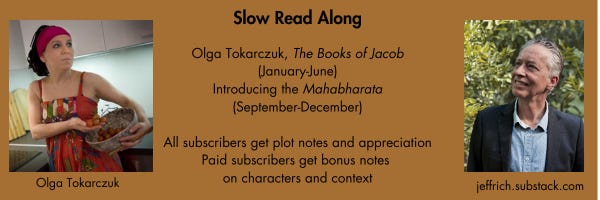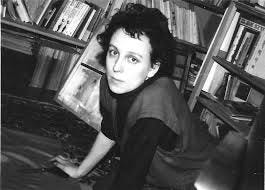Slow Read, The Books of Jacob, Final Chapter
"There can be no doubt that the world is made of darkness."
Welcome to the Slow Read Along of Olga Tokarczuk, The Books of Jacob. You read along at your pace, and I guide you through the story, characters, and rich historical and cultural context.
This week, Chapter 31 of VII The Book of Names concludes the novel. We learn the fate of all the main characters and their connections to later history. We return to our tender narrator, Yente, who miraculously survives the Holocaust. From the Korolówka cave, Yente sees her inventor, Olga Tokarczuk, writing The Books of Jacob.
Since this is the final chapter, this whole post is freely available to all subscribers. If you would like to read back over all the notes and commentary of the Slow Read, upgrade to a paid subscription now.
The Books of Jacob was in my list of 100 Books to Read Before it is Too Late. I hope you come to love this book as I do.
Olga Tokarczuk won the Nobel Prize in Literature in 2018.
Critics described The Books of Jacob as a “decade-defining book.”
Special Note for New Readers and Subscribers
You can check back and catch up on the whole Slow Read of The Books of Jacob, with hyper-linked lists of all posts, profiled characters, and guides on my Slow Read page.
If you are checking in on the Slow Read of The Books of Jacob for the first time, check these guides to this brilliant novel, the best historical fiction of the twenty-first century, in my humble opinion.
13 January - Tips on how to do the 'slow read' of The Books of Jacob
20 January - An overview of the characters of The Books of Jacob
27 January - Historical context of the 'Other Europe' in The Books of Jacob
This is the final post! But you can do the slow read any time. Just refer back to all the posts at the Slow Read page.
Live Stream Next Week - Send me your comments and questions
Next week I will do my first live stream on Substack to wrap up the Slow Read. Send me any comments or questions you have about the book, the author, the history or the slow read experience. I will answer them, as well as live questions, in the live stream.
Please leave me a comment now and I will also respond to questions asked on the day.
I will do the Books of Jacob Live Stream at 10:00 AM (AEST +10UTC) Monday 7 July.
The Story: Chapter 31
The final chapter informs us of the lives and deaths of those touched by Jacob. It links the story of the heresy and persecution of these messianic Jewish heretics to the Holocaust, and our own act of reading this novel and seeking to understand history.
Nahman and other followers of Jacob die in the years after Jacob’s death. His sons Joseph and Roch die, freeing Eva of some family burdens. Tsar Alexander of Russia visits Eva in Offenbach as part of the march to defeat Napoleon. Her model leads him to sponsor a mission to convert Jews to Christianity in Crimea. Eva’s debts catch up with her. She dies under house arrest in 1816. We learn of the fate of other characters, including Kossakowska and Chmielowski, whom we met in the first chapter. Chmielowski’s book parallels the fate of Poland. It finds its way into the Załuski Library and first Commission of National Education. It is taken as a prize of partition by Catherine the Great to St. Petersburg, and then returned with Polish nationhood in 1921. Fittingly for the Burning Archive Slow Read, in its new home New Athens found itself in a burning archive. It burned during the Warsaw Uprising. The final story returns to Yente. Her great-great-grandaughter in Nazi Ukraine in October 1942 refused to register for a death sentence with the German authorities. She and five families fled to the cave of Korolówka in which Yente’s crystalline body or immortal soul rested. The cave refuge in the shape of an alef, loved by Jacob, saved these five families from the death squads and the Holocaust. Yente soars above all these horrors. Years later, she observes from the sky someone calling out her name. It is “a sitting figure, her face lit up by some white glow, hair peculiar, attire eccentric.” It is the author, Olga Tokarczuk, calling on Yente’s narrative spirit to write the book we have just read by typing on a “bright flat rectangle of light,” her laptop computer.
Then, Olga Tokarczuk says goodbye to Yente’s soaring, vanishing spirit.
“Here, however, where we are, there is a buzzing sound, the grim sound of matter, and the world falls into obscurity, and the earth goes out. There can be no doubt that the world is made of darkness. Now we find ourselves on the side of darkness.
Nonetheless it is written that any person who toils over matters of Messiahs, even failed ones, even just to tell their stories, will be treated just the same as he who studies the eternal mysteries of light.”
Books of Jacob, p. 10
Congratulations. You have read one of the great novels of our time. You too have toiled over matters of failed Messiahs. You will be treated as one who studied the eternal mysteries of light.
Question for Readers
Thanks for joining me on this slow read. What comment or question would you like to ask me about the book, the author, the history or the slow read experience? I will answer them in next week’s live stream.
QUESTION FOR READERS:
What is your question or comment for the Books of Jacob Live Stream at 10:00 AM (AEST +10UTC) Monday 7 July?
I have some additional notes for all subscribers on:
Character - The Exodus of the Book of Names
Context - The Caves of Korolówka and the Holocaust.
Character - The Exodus of the Book of Names
There are 120 or more characters in The Books of Jacob. Most are drawn from real history. Many of their names change through the novel. My guide helps you keep track of these dazzling character portraits. You can check back over the characters I have profiled over the last weeks at my Slow Read page.
This week I honour the many characters who leave us in this final chapter.
And so, if Yente had ever professed any religion, after all the constructions her ancestors and her contemporaries had built up in her mind, her religion now is her faith in the Dead and their unfulfilled, imperfect, miscarried, or aborted efforts at repairing the world.”
The Books of Jacob, p. 12
The Book of Names is of course an allusion. Shemot, the Hebrew title of the Book of Exodus, means “names.” Tokarczuk’s novel ends with a crafted list of the names of the heretical Children of Israel as they descended from Jacob.
Here are three surprising legacies from Tokarcuk’s Exodus.
Franciszek Wołowski was Elisha Shorr’s grandson. He became one of the draftsmen of the civil code of Poland and a major legal scholar. His descendant Franciszek became a jurist, statesman, and member of the Polish Sejm. After the suppression of the Polish uprising in1830, he emigrated to France with his family. His son Louis Francois (1810–1876), became a notable French economist, statesman, and banker. More details are here.
Samuel Ascherbach (Gitla and Asher’s son) becomes Samuel Uscher, a Supreme Court justice of the USA (d. 1842). His sisters founded a progressive society of Jews in Breslau.
Thomas Schönfeld, who becomes Junius Brutus Frey, whose social philosophy anticipates Feuerbach, who dies under the guillotine during the Terror, composed a song that translated Nahman’s prayer.
Context - The Caves of Korolówka and the Holocaust
The historical and cultural context of The Books of Jacob is rich and yet strange to many readers. Discovering the history of the ‘Other Europe’ and Tokarczuk’s rich multicultural celebration are rewards of our reading. Each week I share snippets of context from history and literature to deepen your appreciation of the novel.
In her “Note on Sources” Tokarczuk tells us about how she crafted her novel from real history, and her own reflections on the practice of history. She discovered stories and the magnificent coincidences that make the truth of history so much stranger than fiction. Those coincidences linked the archives of Poland and the flickering light of the internet. They connected Chmielowski’s strange encyclopaedia to the story of the Holocaust, and Tokarczuk’s accidental discovery of the story of the Korolówka cave, which became such a central symbol of the novel. In the final paragraph of the book, she wrote:
I feel certain that Father Chmielowski would derive great satisfaction from knowing that his idea of information available to all and at any moment would be realized some two hundred fifty years after his death. It is in fact thanks to the pansophy of the internet that I happened upon the trail of the “miracle” in the Korolówka Cave—the astonishing story of dozens of people’s survival of the Holocaust.
Books of Jacob, p. 5
You too can dive deeper into this story, although Tokarczuk’s symbolic telling of the story is unrivalled. Valeriy Gritsiv has told the story of survival of his grandmother Eticia Goldberg in novel form in 344 Days Underground, as described here. The story of the discovery of the story of their survival, itself a miracle, is told here and here.
Tokarczuk weaved these coincidences, realities, fabrications, and profound thoughts into a compelling narrative about the search for meaning through history. She had never been that interested in historical fiction before writing her book, and yet her historical fiction is a profound reflection on the practice of history writing or telling, which has attracted interest of scholars of historiography. It is one of the reasons the book means so much to me.
Her final sentence of The Books of Jacob expresses that ars poetica of her history.
“This trail also led me to conclude, firstly, that so many things remain quietly connected, and secondly, that history is the unceasing attempt to understand what it is that has happened alongside all that might have happened as well or instead.”
Books of Jacob, p. 5
As we leave the Slow Read of The Books of Jacob, my hopes for this shared reading experience are, firstly, that it has helped you to make more quiet connections in this time of war and strife, and secondly, that it has aided your imagination, the greatest gift of any person, to conceive how our futures might happen as well or instead of the present darkness.
Thanks for reading
🙏🌏❤️
Jeff





'to make more quiet connections in this time of war and strife, and secondly, that it has aided your imagination, the greatest gift of any person, to conceive how our futures might happen as well or instead of the present darkness." Amen to this -- and thank you!
Thank you for this wonderful opportunity to be part of this read-along. You’ve put considerable work into this and your weekly updates were all very useful and relevant. I had to read the last chapter very slowly because I didn’t want to leave behind this unique world we have inhabited for the last 6 months. I will really miss this superb novel.